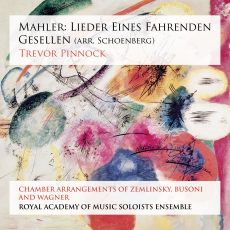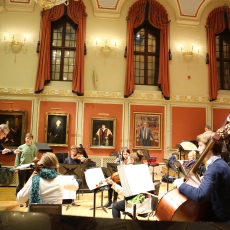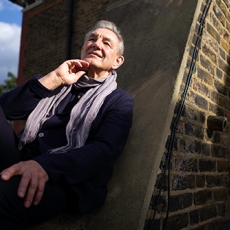Royal Academy of Music Soloists Ensemble & Trevor Pinnock - Mahler: Lieder eines fahrenden Gesellen - SA-CD.net
Performance: 4.5 stars
Sonics: 5 stars
In a number of respects this is the most interesting
(and certainly varied) release so far in this series for Linn of recordings
from Trevor Pinnock and the Royal Academy of Music Soloists Ensemble. As with
the first two volumes Mahler:
Symphony No. 4 - Pinnock and Bruckner:
Symphony No. 2 (arr. Payne) - Pinnock they explore chamber reductions of works written for
larger ensembles in the spirit of Arnold Schoenberg's 'Society for Private
Musical Performance' that he founded in 1918 to both create and educate an
audience for modern music in post-war Vienna.
Mahler's
familiar 'Lieder eines fahrenden Gesellen' is already so transparent in texture
in the composer's own orchestral version that Schoenberg's ingenious
arrangement does not seem radically different from the original. The four songs
are performed by Gareth Brynmor John whose light baritone is well suited to the
narrative of the cycle and Pinnock's flowing accompaniment is delivered with
much sensitivity by his talented young players. Only at the climax of the third
song 'Ich hab' ein glühend Messer' (2.14) did I miss the force of Mahler's full
orchestra - a piano being no substitute for a cymbal crash.
Busoni's
haunting and deeply moving 'Berceuse élégiaque' - subtitled 'The man's cradle
song at his mother's coffin' - was premièred by the New York Philharmonic
Orchestra conducted by Mahler in his final concert in New York in 1911. Here it
is presented in the arrangement by the Schoenberg disciple and pupil Erwin
Stein, its poignancy arguably gaining from the spare lines of Stein's chamber
version.
Stein did
make a nine instrument arrangement of just two of Zemlinsky's 'Sechs Gesänge'
Op 13, but here we have a new version of all six made by the conductor, teacher
and orchestrator Christopher Austin. The 'Sechs Gesänge', based on poems by
Maurice Maeterlinck, were composed originally as songs with piano accompaniment
(1910-1913) and later orchestrated in 1924. Like many artists of the period
Zemlinsky was attracted to Maeterlinck's mysterious poetry and philosophical
symbolism and in their glittering orchestral garb the composer's settings
represent a striking example of late-romantic voluptuousness. Mindful of this,
Christopher Austin has included an accordion and a vibraphone to enrich the
palette of his chamber scoring. The vocal soloist is the young mezzo-soprano
Katie Bray who, barring some occasional unsteadiness, possesses both the
necessary power and beauty of tone to do full justice to these challenging
songs.
The final
item on the disc is Wagner's popular 'Siegfried Idyll' in its original version
for a small chamber orchestra of thirteen players. The work's beauty, charm and
intimacy is conveyed in a way that full orchestral accounts can never match,
and one could hardly imagine a finer performance than it receives here from the
excellent Royal Academy of Music Soloists Ensemble.
Like the
previous releases in this series the recording was made in St. George's,
Bristol (February 2014). The sound is very clean and detailed, but not lacking
in warmth, thanks to the fine acoustic of the venue and the capable engineering
of Philip Hobbs. Linn's fulsome liner notes include texts and translations.
Altogether
a most enjoyable and fascinating issue.


